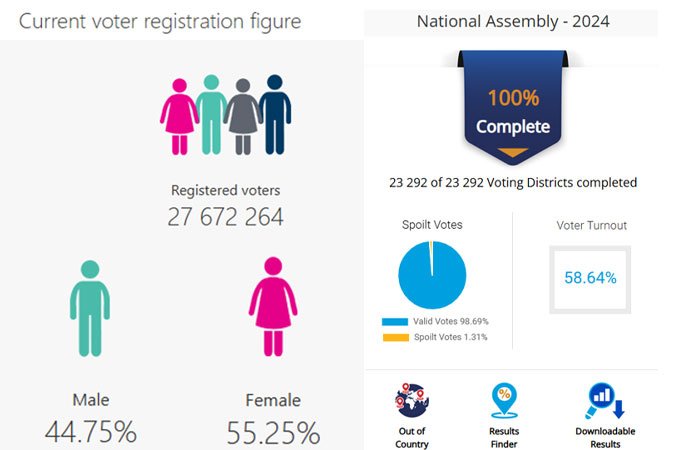South Africa’s 2024 election is set to bring about significant changes in the country’s political scene. For the first time, the African National Congress (ANC) is facing the possibility of losing its majority, which would lead to a new era of coalition governance.
The 2024 election marked a historic low for the ANC, which saw its vote share dip from 57.5% to 40.2% as final results came in. The results mean that the ANC will need to form a coalition government to govern. It has 14 days to do so, however, ANC officials have said they will not replace Cyril Ramaphosa as president as a condition for forming a coalition.
You Can Also Read: ANC FACES TOUGHEST CHALLENGE IN SOUTH AFRICA ELECTION
This shift in political power will introduce coalition dynamics at the national level. The emergence of this new political reality has the potential to fundamentally alter the way South Africa is governed and the policies that are implemented in the coming years.
Decline of ANC
The ANC’s decline began during Jacob Zuma’s presidency, which was characterized by corruption and economic challenges. Zuma’s tenure was marked by numerous scandals and instances of mismanagement, which severely damaged the party’s reputation. Cyril Ramaphosa, who succeeded Zuma, faced difficulties in addressing these issues, leading to further disillusionment among voters.
The public sentiment towards the ANC worsened due to high unemployment rates, persistent poverty, and frequent power outages. The party’s inability to reform itself and key state institutions also contributed to its decline. In the 2019 elections, the ANC secured 57.5% of the vote, but recent polls suggested that this figure could drop to around 42% in the 2024 elections, the final results were, in actuality, even lower.
Election Results


The African National Congress (ANC), the party once led by the iconic Nelson Mandela, suffered a significant setback in Wednesday’s election, securing only 159 out of 400 seats in parliament. This marks a sharp decline from the 230 seats they held in the previous assembly.

“Our people have spoken, whether we like it or not, they have spoken,”
– Cyril Ramaphosa
President of South Africa

Despite the disappointing results, President Cyril Ramaphosa characterized the outcome as a triumph for democracy and called upon rival parties to find common ground, seemingly laying the groundwork for coalition negotiations.
The Democratic Alliance (DA), the main opposition party, has expressed its willingness to engage in coalition talks with Ramaphosa. However, they have voiced their opposition to several key priorities of his government.
According to the electoral commission’s announcement on Sunday, the ANC garnered only 40% of the total votes, a substantial drop from the 58% they achieved in the previous election. Analysts noted that this result was even lower than the party’s feared worst-case scenario of 45%. Consequently, the ANC is now compelled to form a coalition to establish the next government.
Coalition Scenarios
Following the 2024 election, the ANC will need to form a coalition in order to govern effectively. One possible partner is the Democratic Alliance (DA), which could offer economic stability but may face ideological clashes with the ANC. While this coalition might gain market confidence, it could also struggle with internal disagreements due to differing political philosophies and policy priorities.
Another potential partner for the ANC is the Economic Freedom Fighters (EFF). However, the EFF’s radical policies may lead to challenges in governance and decision-making processes.
Smaller parties, such as the Patriotic Alliance and the GOOD party, are also potential partners for the ANC. These alliances might be easier to manage compared to coalitions with larger parties, but they may offer limited stability in the long run.

Possible Effects of Coalition Politics
Coalition politics can bring both stability and instability to a government. On one hand, forming coalitions may help to stabilize governance by including a diverse range of viewpoints and ensuring broader representation. However, it can also lead to frequent policy changes and conflicts, as different parties within the coalition may have competing interests and priorities. This can result in inconsistent economic policies, causing uncertainty in the market and potentially hindering growth.
Overall, the shift towards coalition politics in South Africa may slow down decision-making processes and create a more fragile government in the short term. However, this period may also lead to significant political shifts and policy reforms, as different parties are forced to work together and find common ground. As South Africa’s political landscape continues to evolve, the consequences of coalition politics will play a crucial role in shaping the country’s future.
Speculative Possibilities
South Africa’s coalition government could lead to a variety of outcomes, depending on the parties involved and the compromises reached. If the ANC chooses to partner with smaller parties, it might be able to maintain control while implementing minimal policy changes. While this scenario could offer a degree of stability, it might not effectively address the deep-rooted issues facing the country.
On the other hand, an ANC-EFF coalition could push for more radical reforms, but this alliance may also challenge economic stability due to conflicting policies and governance styles. The EFF’s more extreme positions on issues such as land reform and nationalization could clash with the ANC’s more moderate stance, leading to uncertainty and potential market disruption.
Alternatively, a partnership between the ANC and the DA could ensure a more consistent approach to economic policy, but this alliance might struggle with ideological clashes on other fronts. The DA’s focus on free-market principles and limited government intervention could conflict with the ANC’s historical support for a larger role for the state in the economy and social welfare.
In the long term, the rise of coalition politics may lead to increased political competition and a more diverse range of voices in government. This shift could result in greater democratic maturity as parties are forced to negotiate and compromise to govern effectively. However, it could also lead to potential instability as parties continually negotiate power-sharing arrangements and struggle to find common ground on key issues.
Conclusion
The shift to coalition politics in South Africa marks a significant change, as the ANC’s decline forces it to seek partners. This new era brings opportunities and challenges, with coalitions potentially stabilizing governance through diverse views but also leading to policy conflicts and slower decision-making.
Potential partners like the DA, EFF, and smaller parties each bring unique dynamics. The DA may ensure economic stability, while the EFF could push for radical reforms. Smaller parties may offer limited but manageable support. This period reflects South Africa’s evolving democracy, highlighting the need for effective governance and cooperation among diverse political actors as the country navigates this new reality.


